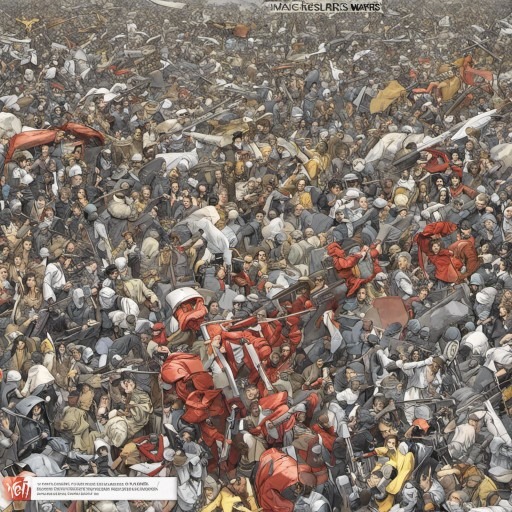
Resource Wars Unveiled: The Global Transformation
September 14, 2023
Introduction:
The “Resource Wars” concept has taken on a new and profound significance in our rapidly changing world. What was once primarily associated with traditional conflicts over resources has transformed into a complex web of trade, geopolitics, and economic strategies.
These emerging resource wars are characterized by covert shifts in global commerce, the resurgence of regions like Africa, and changes in oil production dynamics, all reshaping the economic and geopolitical landscape. At the heart of this transformation is the insistence of resource-rich nations on no longer giving away their valuable resources for minimal returns.
Traditionally, these nations exported raw materials and received a fraction of the value that these materials eventually garnered after processing. However, this paradigm is shifting. Resource-rich countries are now seeking to export finished products or near-finished goods, aiming to capture a more significant share of the value chain, and rightly so.
Several countries exemplify this trend. Indonesia has implemented policies to limit the export of raw nickel and promote the domestic production of value-added stainless steel. Malaysia has imposed restrictions on bauxite exports to encourage its aluminium industry. China, a major producer of rare earth elements crucial for high-tech devices and renewable energy technologies, has imposed export quotas to retain more value within its borders. Brazil, rich in iron ore, is working to export more finished steel products instead of raw materials.
However, this shift in strategy may have significant implications for Western countries. As resource-rich nations move up the value chain, they gain more control over pricing, potentially leading to increased costs for countries traditionally relying on importing these raw materials. This dynamic could disrupt global supply chains, reshaping the cost structure of vital resources.
Unfolding Realities: The Hidden Shift in Global Trade
A significant transformation is taking place beneath the surface of global trade, a phenomenon we alluded to earlier when we discussed the impending issue of actual inflation. While the world’s attention is captivated by the fluctuations in BRIC currencies, which we believe are more of a distraction than a main event, it’s crucial to remember that critical narratives often remain obscured. They are frequently overshadowed by other “compelling” stories that are presented as the main act, especially in an era where sound bites and sensational headlines dominate the discourse.
The actual narrative lies in the subtle yet profound shift in how nations manage their resources. Increasingly, countries are reducing their exports of raw materials, particularly those that accrue more value when processed into finished products. This trend is not just about economic gain but sovereignty, self-reliance, and strategic positioning in a rapidly changing global economy.
Take, for example, the case of copper and nickel. Countries are no longer content with merely exporting copper ore; they are transforming it into metal and finished products within their borders. Similarly, nations are insisting on manufacturing batteries domestically instead of just selling nickel. This shift is not just about maximizing profits; it’s about capturing more of the value chain, creating jobs, and enhancing technological capabilities.
This trend is a testament to the evolving dynamics of global trade. It’s a story of nations taking control of their destinies, leveraging their resources, and strategically positioning themselves in the global economy. It’s a narrative reshaping the world as we know it and a story that deserves our attention.
Shifting Resource Strategies: Impact on Global Trade Dynamics
Indonesia, for instance, has been implementing policies to limit the export of raw nickel and instead promote the domestic production of stainless steel, a value-added product. Similarly, Malaysia has imposed restrictions on the export of bauxite, a key raw material in aluminium production, to encourage the development of its aluminium industry.
China, the world’s largest rare earth elements producer, has also been known to impose export quotas on these critical resources, aiming to retain more of the value chain within its borders. These elements are vital in producing high-tech devices, renewable energy technologies, and defence systems.
Brazil, rich in iron ore, has been making strides in its steel industry, aiming to export more finished products rather than raw materials.
These strategies could indeed lead to Western countries paying more for resources. As these nations move up the value chain, they gain more control over pricing. This shift could disrupt the global supply.
Accelerating Cycles: The Awakening of Africa and the Changing Global Trade Landscape
Global change is accelerating, and nowhere is this more evident than in Africa. Once expected to remain a passive player in the global economy for a longer duration, Africa is awakening at a rapid pace. The continent is increasingly advocating for producing finished goods rather than exporting raw materials, a trend reverberating across the globe.
Simultaneously, the dynamics of the oil industry are shifting. Saudi Arabia, traditionally a cooperative ally of the US in oil production, has chosen not to increase oil production in response to US demands. Instead, they align more closely with Russia, another significant oil producer. This shift is not isolated; several other nations follow suit, indicating a substantial realignment in global oil politics.
These changes have profound implications for the global economy. Regardless of dollar fluctuations, the cost of goods in the West will likely rise. For instance, consider the case of Sriracha hot sauce, which was selling for nearly $70 in some Western markets. In contrast, consumers in Asia, South America, and even Russia could purchase it for $5-7. This price disparity exists even in Russia, one of the most sanctioned countries globally.
This development could be termed a “Resource Value-Added Export Strategy.” If this trend continues to gain momentum, the West may need to adjust to purchasing finished or semi-finished products, driving up the cost of goods. This shift represents a significant change in the global trade landscape, with potential implications for economic strategies, geopolitical relationships, and consumer behaviour.
Rising Energy Costs: Germany’s Competitive Challenge
Germany is currently facing a significant challenge in maintaining its competitiveness due to the escalating costs of energy. Considering this factor alongside the aforementioned shifts in global trade dynamics, it becomes a matter that warrants careful consideration within the context of resource wars.
In the next phase of resource wars, the focus will likely shift towards the interplay between demand and supply dynamics. Producers will increasingly demand higher prices for their supplies and may even reduce production if necessary to secure more favourable terms. This approach is exemplified by Saudi Arabia’s strategic decision to limit oil production, which has ripple effects across the global energy market. It is reasonable to anticipate that exporters of various products will adopt a similar strategy, further intensifying the resource wars.
In such a scenario, the strength of currencies becomes less significant when the availability of supply itself becomes a critical concern. This shift highlights the intricate relationship between resource management, trade, and currency dynamics in the global economy.
Furthermore, it is essential to recognize that while technological advancements such as chips and artificial intelligence (AI) drive innovation and economic growth, they cannot fully satisfy basic human needs. It is worth noting that data centres, which are essential for supporting these technologies, are power-intensive and consume substantial amounts of water. This aspect adds another layer of complexity to the resource wars narrative, as the demand for energy and water resources continues to grow alongside technological advancements.
While this discussion provides a glimpse into the multifaceted nature of resource wars and their impact on energy costs, it is a topic that warrants further exploration. Delving deeper into the interconnections between resource management, trade dynamics, and the challenges countries like Germany face will provide a more comprehensive understanding of the evolving global landscape.
Discover Unique and Valuable Articles for Your Interest

Preferred Stock Market Valuation Is Based Primarily Upon

Mastering Options Trading: Unveiling the Real Secrets

Which of the Following Is an Example of Collective Behavior?

4X ETF: Deadly Risks and Realities

SPY 200-Day Moving Average Strategy: Learn, Earn, and Prosper

Best Tech Stocks To Buy Now: Spotting the Trend

CPNG Share Price: Buy, Sell, or Hold?

Rolling Over Options: The Ultimate Guide to Mastery

Fearless Finance: Harnessing Stock Market Fear for Contrarian Victories

Market Timing Strategies: Debunking Flawless Predictions

Dow 30 Stocks with Dividends: A Winning Strategy for Income Investors

Collective Behavior Generally Takes Which of the Following Forms?

Harnessing Collective Behavior: Strategies for Investment Success

Unlocking Value in Equal-Weighted Index Funds: Benefits and Strategies



